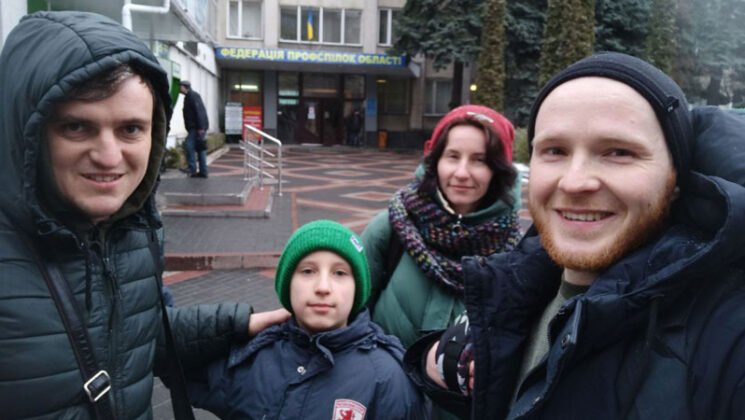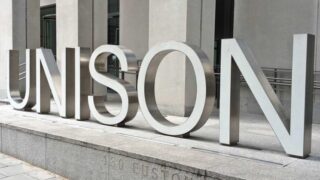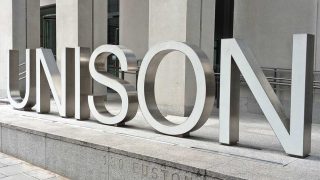Artem Tidva, far right, with a member of the State Employees Union and her family, who became internally displaced after the Russian invasion
Before the war in Ukraine, Artem Tidva was working as a trade union trainer for the European Federation of Public Service Unions (EPSU), of which UNISON is an affiliated union. A Ukrainian himself, he taught union activists how to organise their communities and campaigns, to improve pay and conditions in their workplaces.
But then, on 24 February, Russian forces invaded his country. Suddenly everything changed, for everyone – whether that meant having to fight, to live under siege, or losing one’s home and becoming an internally displaced person or refugee. For trade union activists like Artem, the war has completely rewritten the book on what it means to support your members and fellow workers.
His work over the past few months has ranged from setting up centres for internally displaced people (IDP), even putting some up in his own home, to using his trade union connections to ensure that people in different parts of the country receive the essential items they need, to receiving and directing donations in order to pay for those items.
None of this was a primary requirement of his EPSU job. As he stoically observes: “It wasn’t my obligation. But for me it’s difficult to make a distinction. It’s what I have to do.”
Organising in Ukraine
He’s talking via WhatsApp from Kyiv, speaking into his phone as he moves around the city on his many errands. It’s not the ideal way of conducting an interview, but the fact that it’s taken months for us to reach this point speaks volumes about the demands on his time and the circumstances in which he’s living.
To begin, he tells me a little about his work before the war in Ukraine, where he says, “High union density isn’t always matched by a union’s influence, because members have to learn how to be a powerful, participative grassroots organisation.”
Artem has successful worked with the construction workers union so that, even with 30% density, it is beginning to have a positive impact on salaries, and had turned his attention to other sectors. “We still have problems with education workers, with cultural workers, with healthcare workers, who have a higher level of trade union density but small salaries, and do not know what to do. So we’re trying to promote organising.”
Such work has been stopped in its tracks.
At 4am on 24 February, Artem was asleep in his Kyiv apartment when he heard explosions. At 6am his mother was calling from his hometown, Khmelnytskyi, in the safer part of the country to the west, asking him when he was coming home. Then his EPSU colleagues called, asking how he was. “EPSU has no protocols for what to do if their staff are in a dangerous place,” he says. “It would be strange if we did.”
At first, his instinct was ‘the show must go on’. After taping his windows (to ensure they didn’t shatter if a bomb hit), Artem prepared for a court appearance, where he was fighting legislation that is damaging to hospital workers. But then he received the news that the courts were closed. In fact, only “critical infrastructure” was now functioning – Ukraine was under martial law.
Following his mother’s urging, he accepted a car ride with friends who were also fleeing the capital, for Khmelnytskyi. But he left Kyiv feeling guilty. On the slow and dangerous drive west, his thoughts were chiefly on one question: “How can I be helpful to my comrades?”
Helping the displaced
And this is how Artem started to adapt his skillset and contacts to help during the war. First, he called the regional head of the Federation of Trade Unions of Ukraine, an old friend from his time with the construction workers union, who was now based in Khmelnytskyi. The pair hatched a plan to turn the federation training centre in the city into a hostel for internally displaced people, letting the federation’s unions know that their members could use it as a stopover as they fled the Russians.
They provided 40 beds (below), with their construction colleagues using the insulation material of their trade to lay on the ground so the mattresses would not be placed directly onto cold floors. Artem provided towels, blankets, socks and extension sockets, with EPSU colleagues sending him money, as individuals, to help with his work.
Different unions provided food, as did a number of local restaurants – sending meals for free. And since they were no longer overseeing training, the centre’s staff now managed the makeshift hostel, which included helping newcomers with the necessary paperwork to receive state support as displaced people.
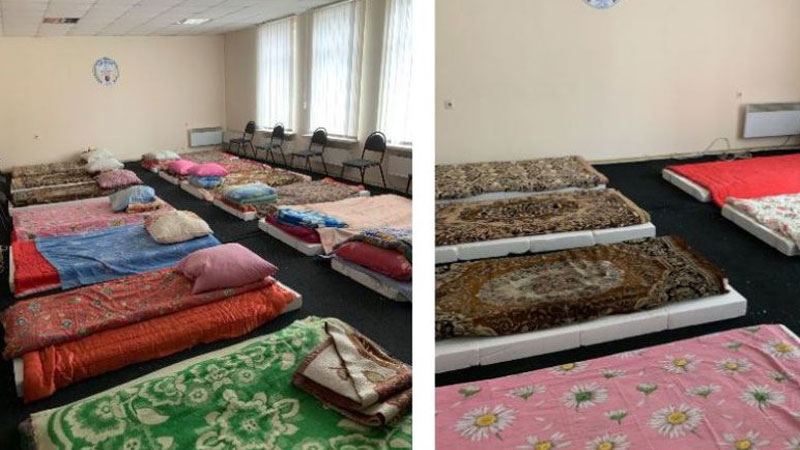
Hostel for internally displaced people in Khmelnytsky
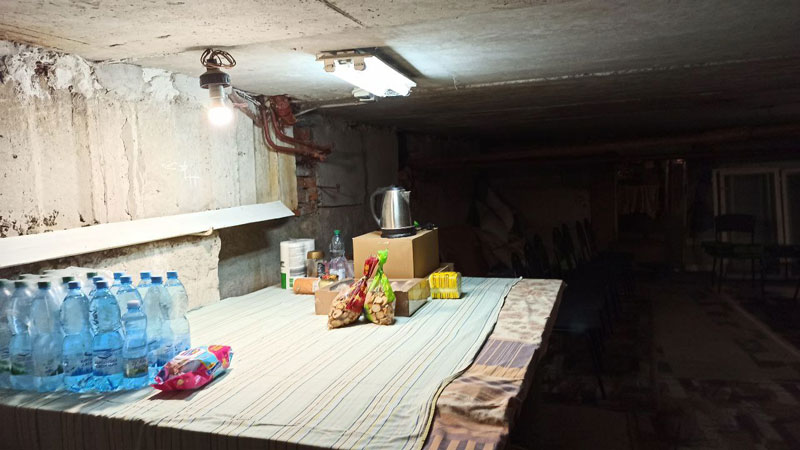
Bomb shelter beneath the trade union centre
Artem recalls: “It became full very fast. And there are nearly 20 similar places in the city, which are also open to internally displaced people – schools, sport halls, fitness centres, a cinema. Usually people stay for a day or two, while they’re looking for a destination, an opportunity to move abroad or to the western part of Ukraine. In my house, too, maybe 15 families of my friends stayed for a night, before moving on.”
People have been coming to Khmelnytskyi from the warzones that have become familiar on the news, such as Mariupol and Kharkov, as well as from Kyiv. As early as March, Artem estimates some 50,000 people entered the city.
But real life is far more than statistics, and Artem has some unusual anecdotes that describe this new influx of displaced people into his city. “I was in the hairdressers one day. As he cut my hair, the barber told me that 80% of his customers now are not from Khmelnytskyi.”
And having made the frightening road journey to safety himself, Artem recognises people who have done the same. “In Khmelnytskyi, if I saw cars crossing a red light, because they are in a hurry, I understood that they were people from somewhere else. People have been so desperate to leave where they are, so desperate to escape and be somewhere else, that they can’t slow down.”
He also remembers the complicated feelings of these displaced people. “Some are glad to have a night with a roof over their heads, some are glad to have a night without bombs, but they are also feeling guilty that they are living in someone else’s house. It’s very difficult.”
Utilising the union network
In June he returned to Kyiv, where he’s having his own problems sleeping. “Three weeks ago, I woke up at six o’clock because I heard ‘boom, boom, boom’. I couldn’t just stay in bed to continue my sleeping, so I went to the corridor and continued to sleep there for the rest of the morning.”
From his apartment, he’s continuing to help however he can. “I think my ‘social capital’ is that I have knowledge about some infrastructures, some organisations, so I help to structure people’s requests.” Put another way, he uses his network of contacts to find out what people need, source it, and find ways of getting it to them, whether it’s everyday toiletries and first aid kits for communities who need them, or boots and bulletproof vests for union members who have joined the military forces.
Meanwhile, Artem says that the traditional roles of trade unions remain, not least because some unscrupulous employers are using the war to justify their actions, such as withholding pay. “Friends from the nuclear power workers union recently told me, ‘Please don’t say that we are a humanitarian organisation. We are still supporting workers’ rights.’”
One huge concern is housing. It’s estimated that two million Ukrainians have lost their homes, so far, but the government is planning a one-year building programme for just 200,000.
“What do the others do?” asks Artem. “Build their homes by themselves? Return to their destroyed houses and try to make them habitable? We are demanding that the state take care of all these people. I think this is a very important activity for us.”
Artem has observed the help that has come to Ukraine from around the world, including the international trade union movement. And he believes that something positive can come from the tragedy that has befallen his country. “With this terrible disaster, we have an opportunity to make our societies closer,” he says. “I really think that can happen.”
How you can help
UNISON branches and members have been asking how they can help. The International Trade Union Confederation (ITUC) has launched an appeal to support the Ukrainian trade union movement and ordinary workers in Ukraine.
Donations should be sent to ITUC-CSI account number 068-9007804-23 with Belfius Banque SA, Boulevard Pachéco 44, B – 1000 Brussels, (BIC/Swift code: GKCCBEBB – IBAN Code: BE92 0689 0078 0423).
Any amount of contribution will be appreciated.
Please mark the contribution for ‘Ukraine’ and if not possible please alert finance@ituc-csi.org to what has been sent and say it is for Ukraine.

